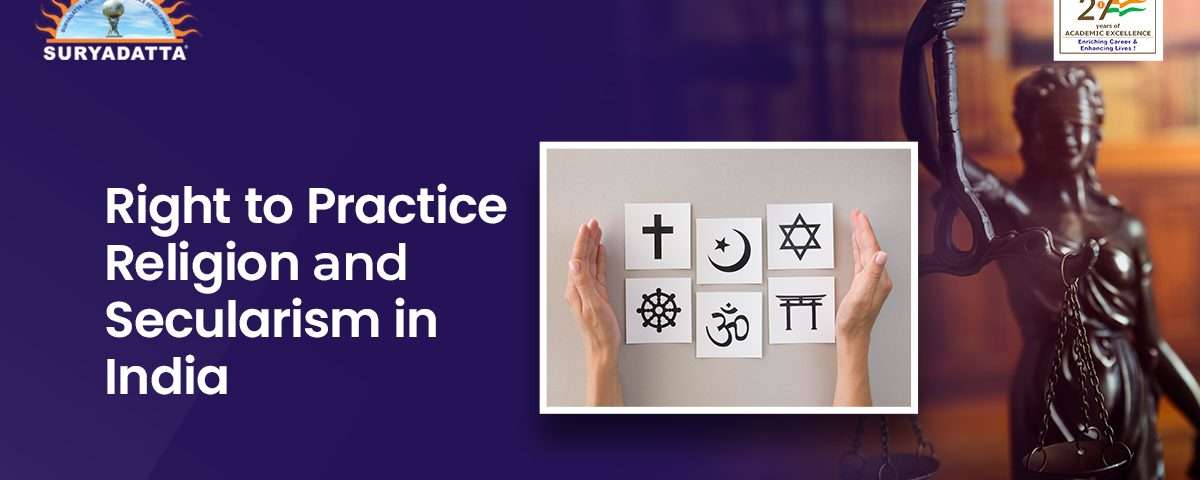Right to Practice Religion & Secularism in In India – Dr. Monika Sehrawat

Why Pursue an LLB Course After Graduation? Key Benefits and Opportunities
April 20, 2025
Uniform Civil Code- Mr. Vijaydeep Munjunkar
April 27, 2025India, a land of diversity, is often celebrated for its rich tapestry of religions, cultures, and traditions. The Indian Constitution, a beacon of democracy, ensures that this diversity thrives under the principles of secularism and the right to practice religion. These principles are enshrined in the Constitution, making India a unique example of coexistence amidst diversity.
In this blog, we delve into the legal framework surrounding the right to practice religion and secularism in India.
The Right to Practice Religion: Constitutional Provisions
The Right to Freedom of Religion is enshrined in Articles 25 to 28 of the Indian Constitution, guaranteeing every individual the freedom to profess, practice, and propagate their religion. These articles collectively aim to balance individual religious freedoms with public order, morality, and health.
1. Article 25: Freedom of Conscience and Religion
Article 25 ensures that all persons in India are equally entitled to:
- Freedom of conscience.
- The right to freely profess, practice, and propagate their religion.
However, this right is subject to:
- Public order, morality, and health.
- Other fundamental rights.
For example, in cases like Shirur Mutt (1954), the Supreme Court defined the scope of religious practices and emphasized that only “essential religious practices” are protected.
2. Article 26: Freedom to Manage Religious Affairs
This article allows religious denominations or sects to:
- Establish and maintain institutions for religious purposes.
- Manage their own affairs in matters of religion.
- Own and acquire property.
- Administer such property according to the law.
3. Article 27: Freedom from Compulsion in Payment of Taxes
Article 27 prohibits compelling individuals to pay taxes for promoting or maintaining any particular religion.
4. Article 28: Freedom in Educational Institutions
This article restricts religious instruction in educational institutions wholly maintained out of state funds. However, religious instruction is permitted in institutions established by religious groups and institutions recognized or aided by the state.
Secularism: The Foundation of India’s Democracy
India’s secularism is unique and distinct from the Western notion. While Western secularism advocates a strict separation between religion and state, Indian secularism emphasizes the equal respect and treatment of all religions.
Key Features of Indian Secularism
- State Neutrality: The state maintains a neutral stance towards all religions, refraining from favoring or discriminating against any.
- Freedom of Religion: Individuals and groups have the freedom to follow, change, or not follow any religion.
- Intervention for Reform: The state intervenes to reform religious practices if they conflict with constitutional values, such as in cases of abolition of untouchability and triple talaq.
Judicial Interpretations of Secularism
The judiciary has played a pivotal role in defining and upholding secularism in India:
- In S.R. Bommai v. Union of India (1994), secularism was declared a basic feature of the Constitution, emphasizing that the state must treat all religions equally.
- The court has also upheld the importance of maintaining religious harmony and protecting minority rights, as seen in Kesavananda Bharati v. State of Kerala (1973).
Challenges in Balancing Religious Freedom and Secularism
Despite constitutional safeguards, India faces challenges in balancing the right to practice religion and secularism:
- Religious Intolerance: Instances of communal violence and discrimination pose a threat to secular values.
- Misuse of Religious Freedom: Propagation of religion sometimes leads to forced conversions, testing the limits of Article 25.
- Judicial Intervention: Courts often face the challenge of distinguishing between essential and non-essential religious practices.
Notable Cases Highlighting These Challenges
- Shayara Bano v. Union of India (2017): Declared triple talaq unconstitutional, marking a significant step in balancing religious practices with fundamental rights.
- Indian Young Lawyers Association v. State of Kerala (2018): Allowed women of all ages to enter the Sabarimala temple, emphasizing gender equality over traditional practices.
The Role of Education in Promoting Constitutional Values
A robust legal education is crucial for fostering an understanding of constitutional principles, including the right to practice religion and secularism. Institutions like Suryadatta Law College (SLC) in Pune play a significant role in nurturing legal minds capable of addressing these complex issues.
Why Choose Suryadatta Law College (SLC)?
Established in 2022 under the auspices of the Suryadatta Education Foundation, SLC offers a comprehensive legal education that combines theoretical knowledge with practical exposure. The college is:
- Affiliated with Savitribai Phule Pune University (SPPU), Pune.
- Approved by the Bar Council of India, New Delhi.
- Recognized by the Government of Maharashtra.
Courses Offered
- B.A. LL.B. (5-year course): An integrated program designed for students aiming to build a strong foundation in law and liberal arts.
Unique Features of SLC
- Expert faculty with extensive legal and academic experience.
- State-of-the-art infrastructure and library facilities.
- Focus on moot court competitions, internships, and real-world legal scenarios.
- Emphasis on constitutional law and human rights, preparing students to uphold secular and democratic values.
Conclusion
The right to practice religion and secularism are pillars of India’s constitutional democracy, ensuring harmony in a diverse society. These principles demand continuous interpretation and application in the face of evolving societal challenges.
For aspiring legal professionals, understanding these nuances is crucial. Suryadatta Law College (SLC) in Pune provides the ideal platform to explore these dimensions of law. By fostering critical thinking, practical skills, and a deep commitment to justice, SLC equips students to become the torchbearers of constitutional values in India.


